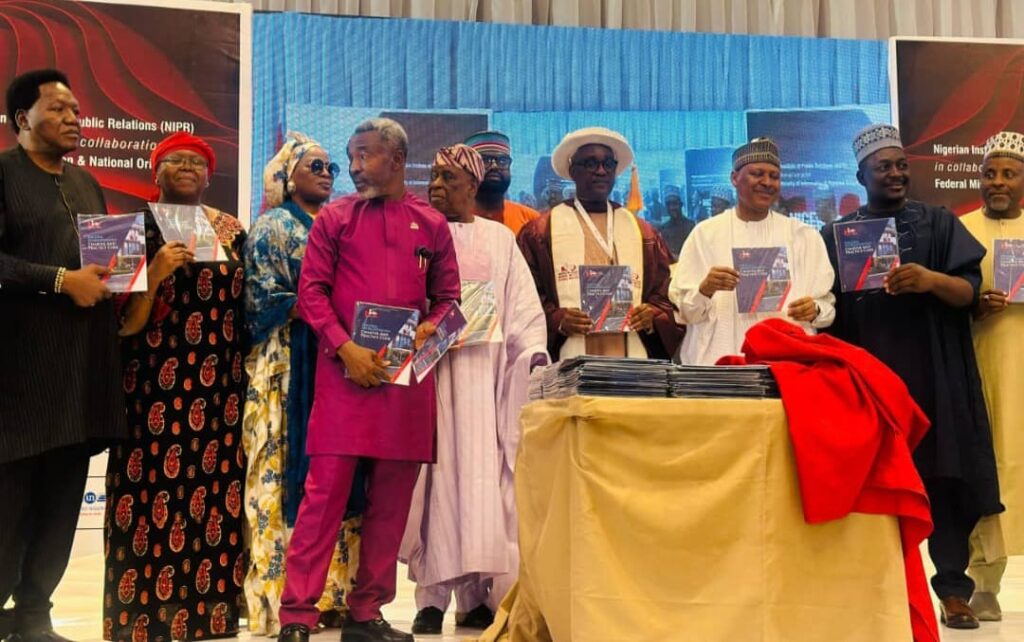
By Angela Atabo
Minister of Information and National Orientation, Mohammed Idris, on Tuesday advocated media literacy to combat the spread of fake news, misinformation and disinformation.
Idris said this at the second edition of the Spokespersons Summit, organised by the Nigerian Institute of Public Relations (NIPR) in Abuja on Tuesday.
He urged the spokespersons to embrace information and media literacy, a composite concept adopted by UNESCO in 2008, combining the competencies of information literacy and media literacy.
“Today, in a world where everyone is a spokesperson, whether a PR practitioner or a chief executive in the public and private spaces, the imperative for media literacy becomes ever more paramount.
“This is because it equips individuals with the tools to decipher, analyse and evaluate messages conveyed through various media channels, enabling the latitude to make informed decisions and engage with media content responsibly.
“Lately, due to the lack of media literacy , the inability to analyse and contextualise media content in order to verify authenticity, public officers, and indeed the general public, have become prone to the cankerworm of fake news, misinformation and disinformation.
“Through media literacy practices, we will continue to grow the capacity to evaluate news articles, identify potential biases, assess the reliability of sources, adapt to fact-checking and information verification mechanisms.”
This, Idris said, would enable Nigerians to distinguish between accurate reporting and misleading content, thus making informed decisions about news consumed and the quality of what is disseminated.
He advised public officers to refrain from becoming malleable to misleading content and being easily swayed by falsehoods or biased narratives.
Also speaking, Rep. Abbas Tajudeen, Speaker of the House of Representatives, said that effective leadership communication is key to improving public perceptions of governmental institutions.
Tajudeen said that was why the House took concrete steps to make its legislative processes more accessible thereby demonstrating a vibrant, accessible institution committed to restoring public trust.
“There is significant potential for a stronger partnership between the NIPR and the National Assembly.
“We can work together to launch public orientation campaigns that explain how policies are created and showcase the important role of parliament and enhance public understanding and reduce negative perceptions.”
Tajudeen appreciated NIPR for honouring of receiving the NIPR Fellowship and pledge to uphold transparency, integrity, and ethical communication in every aspect of his role as speaker of the House.
In his keynote address, Chief Olusegun Osoba, former Governor of Ogun state, urged Spokespersons not to be carried away by sentiments and emotions in the line of duty.
Osoba encouraged them to be sociable, lovable, well mannered and grounded in what they do to promote national unity and nation building.
The Chairman of the Occasion,Chief Edem Duke, Former Minister of Culture and Tourism and Supervising Minister of Information, described spokespersons as the most endangered persons in the public sector.
Duke described spokespersons as the face of organisations and urged them to stand for integrity and professionalism and be guided by ethics and synergise to come up with policies to move the profession forward.
The President and Chairman of Council,NIPR, Dr Ike Neliaku , said the Nigeria Spokespersons Summit (NSS),brought together spokespersons and other stakeholders to exchange ideas, foster collaboration, dissect new trends and acquire new skills.
Neliaku said this was important because spokesperson shapes public perception and
ensures the timely delivery of the right messages to the appropriate audiences.
“As the regulatory body for Public Relations (PR) practice in
Nigeria, The Institute has the duty of ensuring that professional best practices, integrity, and ethical
standards are upheld at all times in PR practice in Nigeria.
“That is why NIPR is launching the Nigerian Spokespersons Charter and Practice Code(SCPC).
“The two core objectives of the SCPC are to: Provide an enabling instrument for spokespersons to
properly understand, and be well guided by the public relations core essence.
“This includes building
reputation, managing perceptions, cultivating goodwill, promoting trust, fostering understanding, encouraging friendship, with mutual respect, and strengthening relationship,
within and outside their operating environment.
“It will also help principals and leaders to understand the professional
functionality of their spokespersons, and measure their performances, in line with the established
standards and content of this charter.”
Neliaku added that the summit was also aimed at conferring fellowship of the Institute on deserving and outstanding Nigerians among (NAN)